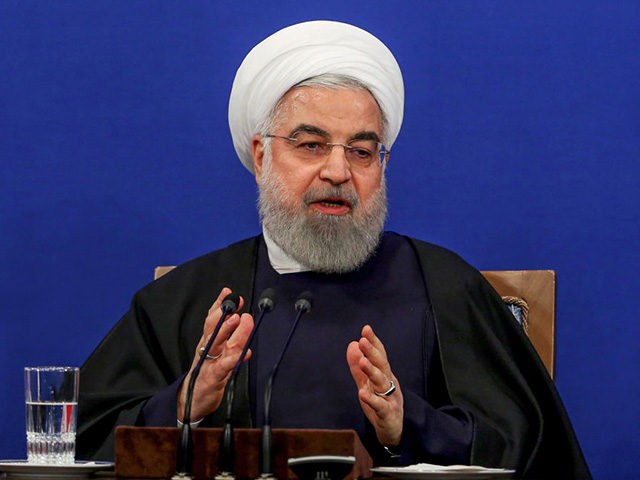Iranian President Hassan Rouhani on Thursday claimed the United States prevented Iran from buying millions of doses of coronavirus vaccine from India.
India halted all vaccine exports to anywhere in the world in late March as coronavirus cases spiked and domestic demand for vaccines surged.
“We have done what we should have done. We bought vaccines from India and we paid for it, but then they said ‘our Judiciary has gotten in the way and we cannot give you the vaccines,’” Rouhani claimed during a video conference on Thursday, specifically blaming former U.S. President Donald Trump.
“Trump dwarfed all the executioners of history as he started a war against the Iranian nation which had no boundaries, like a war that does not shy away from [using] chemical, microbial and nuclear weapons or [targeting] residential and non-residential areas,” Rouhani railed, as quoted by Iran’s state-run PressTV.
Rouhani called the U.S. “rebellious” and “lawless” for keeping sanctions in place during the coronavirus pandemic, but he also claimed the American “maximum pressure” campaign was a failure and Tehran remained unbowed.
Rouhani did not explain why his regime apparently has vast amounts of money available for huge missile bases, advanced uranium centrifuges, and foreign military interventions, but not medicine for its own people.
U.S. sanctions have always made exceptions for humanitarian assistance and medicine, although some critics of the sanctions say foreign suppliers remain nervous about triggering secondary sanctions by dealing with Iran. India slowed or halted most exports to Iran in early March because Iran’s supply of rupees ran low, delaying payments for months. India stopped buying Iranian oil after U.S. sanctions were reimposed in 2019.
Rouhani also appears to have forgotten Supreme Leader Ayatollah Ali Khamenei’s theocratic order banning the import of Western vaccines in January, greatly complicating Iranian medical supply chains because alternative non-Western suppliers must be secured.
In addition to doses of the British-Swedish Astra-Zeneca vaccine manufactured by India, and 150,000 doses of India’s indigenous-designed Covaxin vaccine that have already been delivered, Tehran has also purchased vaccines from Russia and China, and is participating in a trial of vaccines from Cuba. The Iranians have also boasted of creating their own vaccines, but no evidence exists that these have successfully passed clinical trials or are even in development in any way.
Despite this cornucopia of imports and promises to develop domestic alternatives with superior Iranian medical science, the Iranian Health Ministry admitted in March that its domestic vaccine rollout was a failure. The ministry blamed this failure on Russia, India, and America, while critics of the regime pointed to internal political battles, scapegoating, misappropriation of funds, and confusing messages from the theocracy like the Ayatollah’s vaccine ban. The Iranian medical establishment is also deeply skeptical of Russia’s Sputnik V vaccine, essentially dismissing it as a substandard and untested product Iran must settle for because it cannot obtain better alternatives.
India’s pause in vaccine exports, which is expected to last until June, combined with unexpectedly slow vaccine production in South Korea have created a supply problem for many participating nations in the United Nations-backed Covax program. Concerns have been raised that India may not be able to supply the billion doses it was contracted to provide.
Adar Poonwalla, head of the Serum Institute of India (SII), said Wednesday the institute is “prioritizing the needs of India,” but is “still short of being able to supply to every Indian.”
Poonwall in turn suggested part of India’s problem was a U.S. ban on exports of some crucial supplies — a result not of Trump administration sanctions against rogue states like Iran, but the Biden administration invoking the Defense Production Act to give American manufacturers priority access to those supplies. A global shortage of these materials was cited as one reason for the U.S. government to restrict exports.

COMMENTS
Please let us know if you're having issues with commenting.